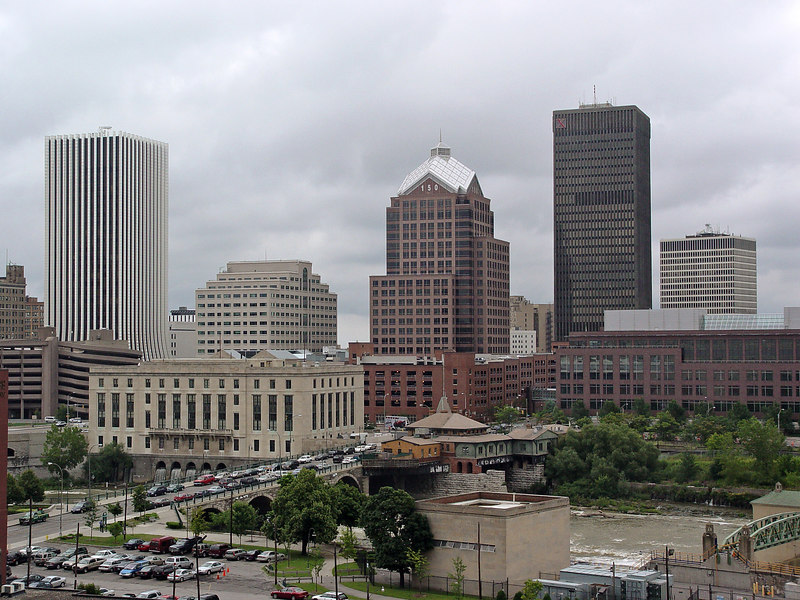Our Region’s Commercial Buildings Carry Massive Potential for Energy Efficiency. What’s Holding It Up?

Rochester appears poised for revitalization—downtown, along the riverway, and in many of the surrounding areas.
A recent in-depth article on the challenges in Detroit by Eleanore Catolico, co-published by the Energy News Network and Planet Detroit, provides critical insights that are relevant to Rochester, Buffalo, and other older industrial cities.
Link to the full article: https://energynews.us/2022/06/16/detroits-commercial-buildings-carry-massive-potential-for-energy-efficiency-whats-holding-it-up/
New enterprises, such as the nonprofit Ecoworks in Detroit and the for-profit Blocpower in New York state, are emerging to help commercial property owners and communities drive for a net-zero carbon future, but important obstacles remain. As the article notes:
The impact of the climate crisis is more far-reaching and intensified than previously assessed, wreaking havoc on ecosystems and livelihoods in Detroit and around the globe….
“We have the opportunity to be leaders in this,” said Connie Lilley, the executive director of the Detroit 2030 District, which helps building owners reduce energy and water consumption. The organization also offers a free program on energy reduction and sustainable practices for its members who own multifamily homes, houses of worship and community centers.
The main obstacle [to expanding acceptance of such measures] is securing funds for energy efficiency retrofits and renewables, which pay for themselves over time.
Fortunately, part of the solution here as well as in Detroit is C-PACE — Commercial Property Assessed Clean Energy.
The overall payback on energy efficiency improvements depends on the age of the building and the type of retrofit. Capital investment in energy efficiency often competes with building owners’ other interests.
Some incentives encourage business owners to adopt energy efficiency improvements…. The Property Assessed Clean Energy Program, known as PACE, is a financing option that allows property owners to implement energy upgrades. Owners can take advantage of utility cost savings which can help repay the loan through property taxes.
(Unfortunately, the NYS C-PACE program does not include stormwater management or water conservation, but it does cover up to 100% of the hard and soft costs for energy efficiency and renewables improvements. For more information on C-PACE in your community, contact Victoria Zelin-Cloud at 585-340-7005 or vzelin@possiblerochester.com.)
Nationwide, energy efficiency can cut energy use and greenhouse gas emissions in half by 2050, an American Council For An Energy-Efficient Economy analysis found. About one-seventh of emissions reductions could come from making existing buildings more efficient.
Making old and new buildings more energy efficient may help Detroit reach its climate goals. In 2019, the Detroit City Council passed a greenhouse gas ordinance, which prescribed a deadline to cut emissions from city sources by 35% by 2024 and reduce city-wide emissions by 2025. More aggressive action targets are being developed, officials said.
The city’s most recent greenhouse gas inventory 2018 found that about 68% of the city’s greenhouse gas emissions come from industrial, institutional, residential, and commercial buildings, according to Joel Howrani Heeres, Detroit’s sustainability director. Reducing the carbon footprint of those commercial buildings could usher the city closer to its goals.
Detroit is taking significant action to reach its climate goals.
Some incentives encourage business owners to adopt energy efficiency improvements. Several utilities offer rebates for business owners. The Property Assessed Clean Energy Program, known as PACE, is a financing option that allows property owners to implement energy upgrades. Owners can take advantage of utility cost savings which can help repay the loan through property taxes.
Of course, we’ve been harping on this for some time. The question is, what’s really holding things up in Rochester and the rest of New York State? Part of it is access to capital, but more importantly, it’s a matter of attitude and information.
Since the Detroit 2030 District launched five years ago, Lilley said she’s seen a noticeable attitude shift among building owners. Before, it wasn’t as common to engage in this type of work. Building owners often juggled a full plate of priorities which may supersede any urgency to update old equipment.
But since the easing of the pandemic, more building owners are joining the District, which now has nearly 400 members. It’s worth considering whether such a program would work here.

